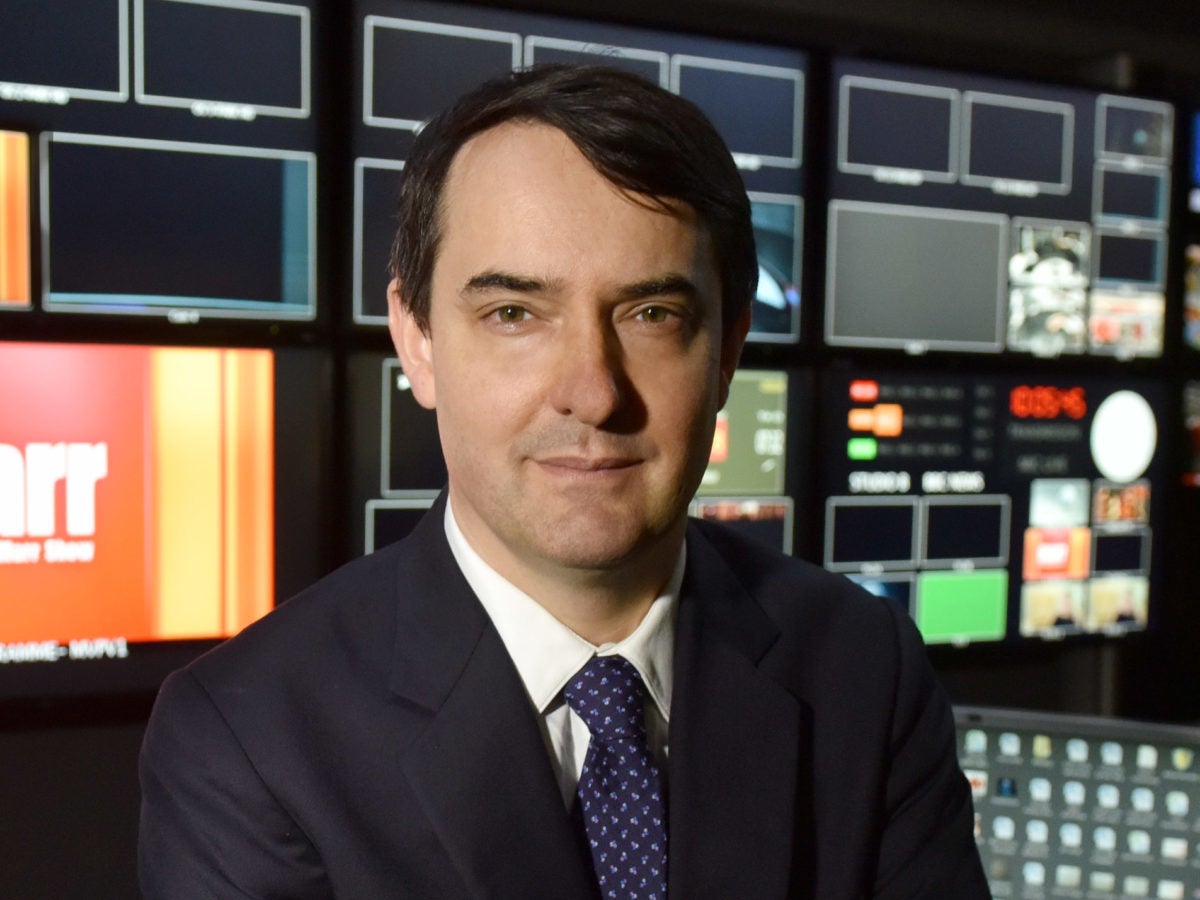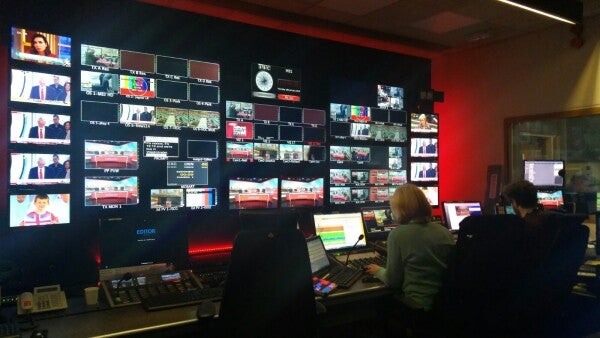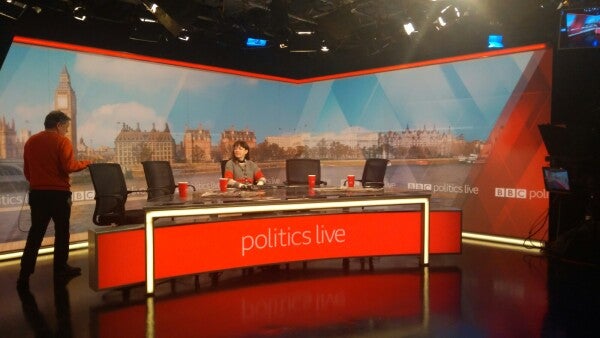
Politics Live boss Rob Burley gets most of his news from Twitter, he tells Press Gazette when we go behind the scenes of the political panel show, which he brought in to replace the long-running Daily Politics.
Burley, head of the BBC’s live political programmes, says he uses the social network, on which he boasts more than 19,000 followers, to “filter” news from across UK national newspapers (but won’t name his favourite).
“I do try and read a lot of stuff,” he says. “But Twitter will help me filter some of that, but also I have some newspapers on my phone – the apps – I believe in paying for content and I’ll do that for some papers.”
Press Gazette interviewed Burley earlier this month ahead of Politics Live, which is hosted by Jo Coburn and Andrew Neil, going on the air.
The show is sometimes criticised over the make-up of its panels, but Burley says political shows would be “really boring” if every episode was balanced across political parties.
He has weathered claims of BBC bias over Brexit – both that it favours the Remain and Leave sides – since taking on his role last year, replacing Robbie Gibb who went on to become Prime Minister Theresa May’s chief spinner in a move that added fuel to that particular fire.
Almost a year into his role, Burley has pioneered the launch of Politics Live, seen Marr pushed back to 10am (rather than 9am) and put Daily Politics to bed as Sunday Politics was handed over to BBC regional bosses.
‘Party balance’ on shows
The former executive editor of Question Time said there were a “variety of different considerations” when building a panel for Politics Live.
“There’s party balance, which is important but one people misunderstand… they sometimes say: ‘Well how come on the show today you haven’t got a Labour frontbench person?’
“It’s because if we balanced every single show across the parties and everything else, then it would be a really boring show because every single show would be the same.
“Especially in an environment now where parties are becoming besides the point on the Brexit discussion, we actually have a whole different set of criteria.”
Whatever efforts are being made behind-the-scenes, the public are not entirely convinced that BBC output is politically impartial.
Research group BMG published a survey in May last year that found 40 per cent of respondents believed the BBC was biased either to the left or right, with 37 per cent believing it to be impartial and 24 per cent saying they didn’t know if it was impartial or biased.
A Yougov poll from February 2018 found that almost half of Leave voters believed BBC News was anti-Brexit while just 13 per cent believed it neither biased towards or against the vote.
By comparison, most Remain voters said it wasn’t biased on the issue or that they didn’t know, while just 13 per cent felt it was pro-Brexit.
Why does Burley believe there is a view that the BBC is anti-Brexit?
“First, there are people saying it, so that’s not going to go unheard by people, and second, I feel what Brexit has done – and it’s not a new thought – is polarised opinion quite a lot,” he says.
“I feel that in our successful attempt to be impartial, we are perceived as biased by people when they see people they don’t agree with.
“They see someone being on telly who is for Remain as being evidence of our bias for Remain, despite the fact there are people who voted for Leave as well.”
A big sticking point for Brexiteers is the make-up of political panel shows. Pro-Brexit blog Guido Fawkes calculated that almost three-quarters of guests on Question Time, Politics Live and Any Questions were pro-Remain between September and October last year.
But Burley, 49, is critical of how people number crunch the Remain/Leave make-up of BBC panels.
“There’s a long-standing battle at hand on Twitter about this, which is that people want us to balance as if we were in the referendum still,” he says. “So therefore you count Theresa May as a Remainer, irrespective of the fact that she’s now attempting to execute Brexit.”
He adds: “The Government are carrying out Brexit, so we interview them about Brexit and about them seeking to fulfil the result of the referendum. It’s as if we’re stuck in time. We need to just move on. They must know this intellectually.”
But, he goes on: “Where they’ve got a point, I suppose, is that the balance of opinion in Parliament is more towards Remain than it is towards Leave in general terms, and people, maybe with some hesitation, support Brexit just because they feel they have to now,” he says.
“We do make sure we include voices in the programmes who are full-throated, full-blooded Brexiteers and it is part of our consideration, but to make a crude calculation based on it – I’m just not going to even do it. It just doesn’t make any sense.”
Arron Banks on Marr
Remain figureheads have also taken issue with the BBC’s decision to have Leave.EU co-founder Arron Banks on the Andrew Marr Show as he and the campaign faced a National Crime Agency probe.
Pressed on why he invited Banks on the show, Burley tells Press Gazette: “He hadn’t been charged with anything, he’d been referred. Normally people in his position don’t come on television because they say don’t want to come on television.”
He adds: “He made himself available, gave us paperwork … I think [BBC journalist] John Sweeney’s made two films on Newsnight which have used that evidence, further digging into it… Loads of questions were still in the air and I think it was the right thing to do.”
Banks is not the only BBC guest to have prompted a backlash of late. Appearances from former Trump deputy assistant Sebastian Gorka – a man reportedly subject to a “soft ban” from some Fox News shows last year – also led some viewers to question the broadcaster’s booking decisions.
Batting back criticism, Burley says Gorka’s former position as an adviser to the US President meant he could not go ignored and emphasises that he was given tough treatment from co-host Andrew Neil.
But he adds: “Obviously if there are people who are entirely unrepresentative, have no electoral support, are advocating racist views or hateful views then there need to very, very strong reasons why you would interview them.”

The gallery at BBC Millbank studios. Picture: Press Gazette
Press Gazette asks Burley if he would ever take a cue from Sky News and set up an interview with Stephen Yaxley-Lennon, aka Tommy Robinson.
He says: “What you can’t do is mainstream it, in the sense that they don’t represent any significant number of people in terms of political support… you wouldn’t just throw them on your panel and have a little chat about something light and then they can just weigh in.
“But you might in certain controlled circumstances, thinking about it very carefully, interview them to learn more about their perspective if it is becoming influential and important.”
Moving away from figures on the political right, Burley has seemed eager to draw new voices onto the shows under his watch: Politics Live, Andrew Marr, This Week, Westminster Hour and Newswatch.
He stressed the importance of having supporters of Momentum, the pro-Jeremy Corbyn Labour movement, on politics programming because of their dominant position in the party.
“We have them on a lot,” he says. “[Novara Media senior editor] Ash Sarkar has been on quite a lot. I welcome it. They’ve enlivened our programme.”
But Burley says he also wants “right-wing voices who are intellectually engaged with ideas” on the programme, adding: “You don’t just want to have an agreed set of limits on what kind of ideas are acceptable or not.”
‘Westminster bubble’
Although Burley appears satisfied with efforts to improve political diversity on BBC shows, he is less sure Politics Live has broken free of the SW1 bubble as much as it should have.
“We talk about diversity. Trying to increase voices outside London on the show is hard and we’ve got to do better actually,” he says. “We did have an aspiration we’d do more of that and I think we could include regional newspapers.”
But what is stopping live BBC politics shows reaching beyond SW1 with modern technology at its disposal? “It’s not difficult technically to achieve it, it’s just part of the thing is the chemistry in the studio, and you can to an extent involve someone externally, but it’s never quite the same, so we must do better on that. We get a C- on that front,” he says.
“We are a show whose heart is in Westminster. It’s made in the middle of Westminster – in a sense it is in that bubble. But the previous show [Daily Politics] set its concerns on those things more than we do.”
Not a fan of ‘you’re a lying shit’ approach
Politics Live has made other efforts to separate itself from its predecessor. The most obvious changes are to the set: the crowded coffee table (probably a better fit for the pokey Millbank studio housing the show) has been replaced by a table twice the size.
A high-def video of Parliament from South Bank with a rolling “BBC Politics Live” ticker tape now backdrops guests. Even the cups match the red and white scheme of the studio.
More important are the shifts in the tone and content of the show. It is more conversational than Daily Politics. Coburn told Press Gazette in August last year that the show drew inspiration from US talk shows like Morning Joe.

Burley says he is not a fan of the “you’re a lying shit” approach, with some comparing the show to ITV’s Loose Women at launch – which he says were drawn purely because “there are women involved at a desk”.
Burley says podcasts are another influence on Politics Live, which airs at 12.15pm weekdays (or 11.15am on Wednesdays). He points in particular to the BBC’s own Brexitcast podcast.
He says: “You and I know if we have a conversation about politics, we’ll break off in the middle of it and have a joke about something, and go back to politics and nobody would die.
“But the whole approach to news and politics is that you do it seriously. But people don’t talk like that, and on podcasts like Brexitcast they have a laugh about something but they’re deadly serious.”
What does Burley say to claims that US politics shows and podcasts are a bit too chatty? “They are chatty, but what I like about them – it’s an American trait found in the quality press like the New York Times – is that they’re very serious as well.
“They do take politics very seriously but they do it in a kind of way that’s approachable and looks good and uses devices to keep people hooked in.”
The new format seems to have paid dividends when it comes to viewership, with the series averaging 311,000 viewers, up 17 per cent on its average audience in the autumn of 2018 compared to autumn 2017.
“We’re clearly helped by the fact the [Brexit schism] story has ignited at the time when we launched,” Burley says.
“But it was already visible before it got really hot and also even if you go back a year, in the immediate aftermath of Theresa May failing to win the election, that was still a very hot political time – so it wasn’t as if it was business as usual.”
‘It’s hit the audience a bit’
Marr’s show has not fared quite so well since it was moved later in the schedule on Sundays, however. Press Gazette understands is viewership has fallen by around 200,000 viewers on average to about 1.46m since moving an hour later to 10am.
Speaking about the schedule change, Burley says: “It’s hit the audience a bit. But the sense I have is that it’s an experiment to try and overall improve BBC One’s ratings on a Sunday – bring in younger audiences, all those things which we know are important.”
How does he aim to draw younger viewers to Politics Live? “Obviously it’s a huge challenge,” he says. “The show goes out at 12.15pm. I’m not expecting lots of young people to be switching the telly on at that time.
“What we are trying to do, with some success, is when we commission our films, we commission them with a view to going on social media and being the kind of subject matter that might interest younger audiences.”
When younger audiences are becoming attuned to cheap, on-demand streaming services such as Netflix and Amazon Prime, does the £150-yearly license fee model not present the biggest hurdle for the BBC if it plans to reach millennials and Generation Z?
“I would say the licence fee is huge value for money,” Burley says. “All the things we do, all the array of stuff the BBC does miles away from here and politics, and then the stuff we’re doing on this massive story of Brexit.
“Young people are interested in Brexit as well, so when they see the coverage they get on the BBC, unrivalled in every way, then I hope it will have that effect and people will recognise that if you put it up against your Netflix or Amazon Prime subscription it’s actually incredibly good value for what you get.
“That’s all we can do: continue with our mission – quality, impartiality – and hope that will speak to people.”
Quick Q&A with BBC live political shows boss Rob Burley
What time did your alarm go off?
The kids woke me up – the four-year-old is up about half six. I live in Brighton so I have to travel in. I got a call from a senior spin doctor this morning at about a quarter to seven. Then I talked to the editor of the day about seven o’clock if I can manage that with the kids. Then I’ll talk through the programme with that person: “What are we doing?”, “Are we still where we were last night?”, “Should we change things?”.
Then I’m here, chat with people and have the editorial meeting. Then I will talk with people on the Marr Show on a Thursday. Politics Live goes out at 12:15 and there are lots of meetings. Depending on what’s happening, I get on my way home about six o’clock.
Does always being switched-on not create a level of stress?
I like it. Tragic isn’t it?
Where do you get your news from? What papers?
Twitter mainly. It brings me everything from those websites.
Have you got a favourite newspaper?
I love them all. I’m not going to name my favourite paper. I do try and read a lot of stuff, but Twitter will help me filter some of that, but also I have some newspapers on my phone – the apps – I believe in paying for content and I’ll do that for some papers.
How often do you leave SW1 and London – not just as part of your job?
Well I support Liverpool, so I try and go to Anfield.
How many times a season?
About three or four times this year. I’m seeing Bournemouth in February. I went to see Brighton last year and I went to see Southampton.
Picture: BBC
Email pged@pressgazette.co.uk to point out mistakes, provide story tips or send in a letter for publication on our "Letters Page" blog
